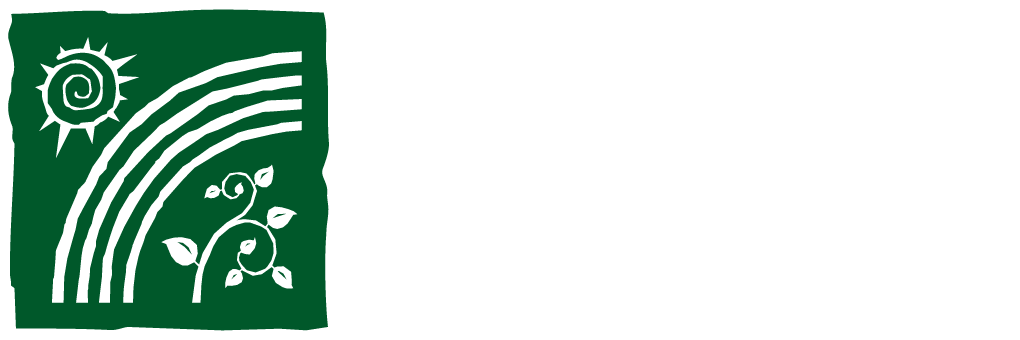Ecology at Rainbow
Incorporating sustainability into our daily business operations
Rainbow Grocery’s Ecology Committee oversees the “green” elements of our business practices. The committee coordinates the daily tasks of recycling, reducing, or re-using materials that are part of our business. Rainbow continually researches ways to decrease its ecological footprint. We participate in San Francisco Department of the Environment’s Green Business Certification Program, as well as Clean Power SF—which provides Rainbow with 100% renewable energy!
Rainbow has been able to provide customers and workers with a non-toxic register receipt for years. Studies showed that the bisphenol-A (BPA)-free receipts we were using still contained bisphenol-S (BPS), also an endocrine disrupting substance. Like BPA, it is easily absorbed through the skin. Although the industry still claims that BPA-free BPS-coated papers (as well as plastic products) are “safe”, there is enough controversy that a few paper manufacturers, processors, and distributors are now providing receipt papers without any toxic phenol content.
As our supplier’s main customer for the BPA-free receipt rolls, Rainbow has been at least partly instrumental in providing a demand for BPA- and BPS-free receipt paper. We were the first in the Bay Area to provide these phenol-free receipts for our customers. We hope that successful use of these new receipts will encourage other businesses to make the change as well.
Our receipts are now safe to recycle; but keep in mind that you will still be getting the toxic receipts from other stores and you should discard them as soon as possible. Put them in the trash, not the recycling bin where they have been shown to contaminate the recycling stream. These receipts can contaminate other things as well, so wash your hands frequently and don’t let your children play with them. When shopping, look for BPA/BPS free drinking containers and use glass not plastic baby bottles.
Our new phenol-free receipts are manufactured using vitamin C instead of phenols, and therefore have a natural yellow tint.
Rainbow Grocery is committed to the health of its workers and customers and continues to research and offer the best options as they become available.
For more details, read on below, or talk to a member of our Ecology Committee.
MORE INFORMATION
Ingredients
Our new register paper uses a vitamin C product as the image developer and the register system doesn’t use ink. Instead it uses heat printing to develop an image on a paper coating. The vitamin C coating is less reactive to heat and results in a lighter image than our old receipts. However, our new receipts will last for years and can be scanned.
Another supplier we know might be using a different chemical, also supposed to be benign, but in both cases we are unable to get more information about any of these ingredients.
Lack of information and regulation
One problem identifying toxins in consumer products is that manufacturers claim “trade secrets” in order to not release chemical compositions. Regulatory agencies do not require manufacturers to test for safety before putting products on the market. There is information (MSDS sheets) for many chemical products but not for all “inactive” ingredients or for papers.
Spreading the word
We plan to help spread the information about phenols in register receipts to stores in our co-op networks and help them make the switch. Together we might be able to access independent testing to ensure the information we are receiving is accurate.
If you’d like to know possible sources for these new receipt rolls, inquire here. We can provide you with our wholesalers’/distributors’ information.
Further reading
For more information on endocrine distributors in BPS/BPA and their negative health effects, see these links:
http://www.scientificamerican.com/article/bpa-replacement-also-alters-hormones/
http://ehp.niehs.nih.gov/121-a76/
http://www.huffingtonpost.com/beth-greer/healthy-living-news_b_4944326.html
Using compostable “Biobags” successfully
- Our provided compostable Biobags® contain a large portion of Non-GMO corn starch; they “breathe” more.
- Fruits and vegetables with skins store better as ethylene gas that creates over-ripening is released.
Firm produce like Broccoli, cauliflower, beets, carrots, do not “sweat” and store well for days. - Leafy greens wilt quickly (but do not rot). Try storing greens in washable, re-usable Debbie Meyer Green Bags or Peak Fresh. They work great! Find them on the pillar by the onions.
Thank you for helping to create the transition to compostable bags and keeping 2.3 million old style plastic bags out of the trash (Rainbow customer use 2012). Recology & SF Environment look to us to be the forerunners of change in the retail market. Let’s make it happen!
Reusable bag options at Rainbow:
Produce Department:
- Debbie Meyer or Peak-Fresh Bags: plastic with microscopic holes, best storage of produce. Reusable for 6 to 12 months with proper care.
- Chico bags: 3 types available—cotton, nylon, and nylon mesh. These will last years with proper care and are good for hard produce or larger bulk.
- Rainbow unbleached cotton bags: made and printed in San Francisco. These will last years with proper care and are good for hard produce or most all bulk.
Our Sundries Department also carries a wide variety of reusable, resealable bags in different sizes.
Myths vs. Facts Regarding Single Use Bag Bans and Fees
Myth: Recycling plastic bags is the best solution to addressing the litter problem.
Fact: Plastic bag recycling is costly and just doesn’t work.
Despite a 15-year statewide effort in California, recycling plastic bags has failed. The California Integrated Waste Management Board estimates that less than 5 percent of all single use plastic bags in the state are actually recycled. Plastic bags cost municipal recycling programs millions each year, when bags jam sorting equipment at recycling facilities. In San Jose, less than four percent of plastic bags are recycled and work stoppages from jammed bags cost the City approximately $1 million per year.2 Failed recycling efforts means billions of plastic bags are thrown away, blow onto our streets and float into our waterways. Plastic bags are the quintessential litter item: there are billions of them, they are used for a few short minutes, and they are light and easily transportable.
Myth: Recycled plastic bags are a valuable commodity.
Fact: The market for recycled plastic bags is small and unstable.
At the moment, a single manufacturer purchases 70 percent of the plastic bags recovered nationwide, to make outdoor decking. In 2008, Newsweek reported that the company lost $75 million in the previous year, raising questions about the long-term viability of the end market. Some curbside programs will take plastic bags if they are bundled, but the commodity is low grade and brings a low price, partly because it gets dirty during handling and transportation. Even the plastic bag industry doesn’t use its own post-consumer material. Recyclers are sometimes forced to stockpile bales of bags or even pay to get rid of them.
Myth: Bans or fees on plastic bags will just push people to use more paper bags.
Fact: With well-designed policies that address both plastic and paper bags, consumers will switch to reusable cloth bags.
The legislation supported by Save The Bay and other advocates covers all single-use bags, both paper and plastic. This is a proven way to decrease the use of both kinds of bags in favor of reusable bags – which are inexpensive and long-lasting – ultimately saving retailers and consumers money. Every year in the U.S, consumers and retailers spend billions of dollars on excessive quantities of single-use bags that have an average use time of 12 minutes.
Myth: A fee on plastic bags didn’t work in Ireland.
Fact: Ireland’s bag fee dramatically reduced plastic bag usage and plastic bag litter.
Ireland’s Environmental Protection Agency submitted a letter to the San Jose City Council rebutting the American Chemistry Council’s (ACC) false claims about Ireland’s bag fee. In this letter, Ronan Mulhall of the Waste Policy division confirms that plastic bag litter dropped by 93 percent and plastic bag use decreased by approximately 90 percent in the year following the Plastic Bag Levy. Ireland later increased their fee to approximately 33 cents (US). The Irish EPA reports that these dramatically lower levels of plastic bag use and litter are being maintained.
Myth: Fees on single use bags will negatively impact low income people.
Fact: No one has to pay the fee.
A single-use bag fee is only charged if you do not bring your own bag. Lower income communities (some of the most blighted by plastic bag litter) are already paying for plastic bags through city taxes and increased food and retail prices. Every bag fee policy currently under consideration at the local and state level would either subsidize reusable bags for low-income residents or exempt low-income residents from paying the fees.
Myth: Single-use bag bans or fees are bad policy in this time of economic crisis.
Fact: Reducing the use of single-use plastic and paper bags will save us all money.
Retailers currently embed 2 to 5 cents per plastic bag and 5 to 23 cents per paper bag in the price of goods— adding $30 or more per person annually in hidden costs. In contrast, when consumers use reusable bags, retailers save money and can lower prices. Many grocers offer a 5-cent rebate for bringing your own bag, which can add up to about $60 in savings per year for an average family.
Bags clog storm drains and recycling equipment, costing cities millions, and bag litter lowers property values and degrades recreational areas. In addition to the out-of-pocket cost passed on from the retailer to consumers, California taxpayers spend approximately $25 million every year to collect and landfill plastic bags.
San Jose City staff estimates that it costs at least $3 million annually to clean plastic bags from creeks and clogged storm drains. Single-use bag production depletes resources and contributes to carbon emissions and global warming. We consume approximately 14 million trees and 12 million barrels of oil to produce the billions of plastic and paper bags we throw away in the United States every year.
Myth: Plastic bag litter isn’t really a problem for the environment.
Fact: 1.37 million plastic bags were removed from coastal areas worldwide in one day last year.
Plastic trash entangles, suffocates, and poisons at least 267 animal species worldwide. According to the California Coastal Commission, up to 80 percent of all marine debris is plastic, which never biodegrades. Plastic bags were the second largest item of litter picked up by volunteers during the Ocean Conservancy’s 2008 International Coastal Cleanup Day. It is estimated that one million plastic bags pollute the Bay every year. Scientists recently measured 334,271 pieces of plastic per square mile in the Great Pacific Garbage Patch.
Myth: Education about responsible use and disposal of plastic bags will reduce litter.
Fact: Unfortunately, public education hasn’t worked, despite massive public investment.
Huge amounts of money have been spent on public education about litter. One example is CalTrans’ “Don’t Trash California” campaign. Yet, we still see our highways coated in bags, cups, and cigarette butts. A fee on single use bags provides an incentive to consumers to change their behavior and switch to reusable bags.
Shopping
About Rainbow
Apply to Work
Green Business
History & Mission
Rainbow is closed on the following holidays:
New Year’s Day
Martin Luther King Jr. Day
César Chávez Day
International Workers’ Day
LGBTQIA Pride Day
Labor Day
Thanksgiving Day
Christmas Day

